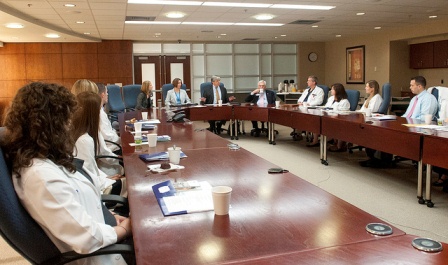College of Medicine expands training opportunities

One way to address ongoing physician shortages in rural communities is to train medical students in the communities where they will ultimately choose to practice, and the University Park Regional Campus of Penn State College of Medicine reached a milestone during FY 2011-12 in its mission to do just that.
When Penn State Milton S. Hershey Medical Center's Board of Directors meets on Wednesday, Harold L. Paz, MD, Medical Center CEO, Penn State's senior vice president for health affairs, and dean, Penn State College of Medicine, will present highlights of the Medical Center and College of Medicine's academic activity during the last fiscal year, including a mention of the first cohort of College of Medicine students who started their clinical training at the University Park Regional Campus.
The Regional Campus welcomed its first group of 13 third-year medical students to begin their core clinical training in State College, in collaboration with local Penn State Hershey faculty, Mount Nittany Medical Center faculty, Mount Nittany Physician Group and other medical providers in the community.
Bringing medical students to State College from Hershey is designed to help improve access to patient-centered, high quality, cost-effective health care for local residents by creating an educational environment for training the next generation of healthcare providers. Primary care and rural-based medicine are the centerpieces of the mission.
“The Regional Campus provides a unique opportunity for this cohort of students to work with a close-knit faculty in a patient care environment that promotes primary care in community and rural settings, and the students have expressed how engaged they feel in the learning process there,” said Eugene Marsh, MD, senior associate dean of the University Park Regional Campus. “The partnership with Mount Nittany Medical Center and community physicians results in a dynamic, energetic and talented group of educators dedicated to promoting a great student experience that complements what students have come to expect from the College of Medicine in Hershey.”
The regional campus will eventually train as many as 48 College of Medicine students each year, with 24 in each of the third- and fourth-year medical classes. Some of these students may select to enroll in dual-degree programs as well, through the Smeal College of Business and other programs. Core clinical rotations include family medicine, primary care, surgery, OB/GYN, pediatrics, neurology, psychiatry and medicine. A residency program in family medicine is also in development, along with various collaborative research initiatives between University Park and Hershey.
The College of Medicine also added new degree program options this past year, including a dual M.D./MBA option in conjunction with Penn State's Smeal College of Business, and a Ph.D. in biostatistics, a program offered at only a select number of institutions nationally.
During the meeting, Paz will also report on the continued high achievements of incoming and outgoing College of Medicine students.
Nearly one in six students who apply to medical school applies to Penn State, with more than 7,300 applications for 145 slots. Prospective College of Medicine graduates continue to outperform national peers: 97 percent of students pass on their first attempt of the Step One of the United States Medical Licensure Exam (USMLE), better than the national average of 94 percent.
In May, the College of Medicine graduated its 42nd class and awarded 131 medical degrees, 36 master's degrees, 28 Ph.D.s, and two joint M.D./Ph.D. degrees. Of the medical class of 2012, 41 percent entered residency in primary care fields—family medicine, pediatrics, and internal medicine—and 27 percent stayed in Pennsylvania.
If you're having trouble accessing this content, or would like it in another format, please email Penn State Health Marketing & Communications.
